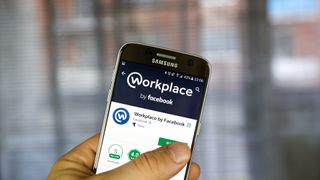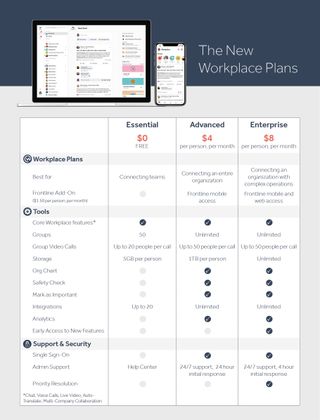Facebook confirms Workplace price hike is on the horizon
Customers will now have the choice of free, $4 or $8 tiers with optional bolt-ons

Facebook is set to remodel its pricing structure for its collaboration service Workplace in what equates to a price hike for users currently paying for the service.
Since its launch in 2016, the two million paying users the company has attracted have been on a $3 per user per month plan, the only 'premium' tier available, with a basic version given to users for free.
As of September, Workplace will offer three pricing tiers instead, including a rebranded premium tier Workplace Advanced that raises the cost of the platform to $4 per user per month. The basic package has also had a name change, now called "Essential", and a new tier known as "Enterprise" will run at $8 per user per month and will offer priority support services and early access to new features.

The "per user per month" format is also a change for the company, having previously charged based on how many users were currently active on a company's account. Charging a flat fee will generally result in higher overall costs, but this will also mean customers will pay the same predictable rate each month.
Facebook has confirmed that existing paying users will continue to pay $3 per user per month until 30 September 2020, after which time the new pricing structure will come into effect.
Interestingly, Facebook is also introducing a new add-on package called Workplace Frontline, specifically designed to cater for those frontline workers who engage directly with the general public, such as a cashier or those on a shop floor, who may sometimes feel disconnected from the rest of the business.
Organisations on the Advanced or Enterprise plans can bolt-on these users to their price plan for an additional $1.50 per user per month, regardless of whether they are active or not.
Get the ITPro. daily newsletter
Receive our latest news, industry updates, featured resources and more. Sign up today to receive our FREE report on AI cyber crime & security - newly updated for 2024.
According to Facebook, workers are classed as frontline if they spend less than 50% of their time at a desk, are paid hourly, or do not have an email address. Nurses, doctors, facility workers, those in public services, couriers, warehouse staff, and those in the hospitality industry would all qualify for this status.
Aside from these changes, the individual features assigned to the tiers will remain the same.
The platform currently boasts over two million paid users, having attracted big brands like Walmart, Nestl and Telfonica, as well as the likes of Spotify, Grab, WWF and Save the Children.
While a price hike is never a welcome change, the restructure is the first in the platform's short history and somewhat necessary given the fierce competition in the market. It needs to mature in the face of the rapidly growing Microsoft Teams, which recently passed Slack in terms of subscribers and offers similar services targeting both backend and frontline workers.
Slack, for its part, is also garnering a great deal of attention following its decision to become a publicly traded company, particularly as stocks sold far higher than expected. It, too, will be looking to compete against its rivals, but doubts remain as to whether it has the business model and infrastructure clout to remain competitive.
Dale Walker is the Managing Editor of ITPro, and its sibling sites CloudPro and ChannelPro. Dale has a keen interest in IT regulations, data protection, and cyber security. He spent a number of years reporting for ITPro from numerous domestic and international events, including IBM, Red Hat, Google, and has been a regular reporter for Microsoft's various yearly showcases, including Ignite.





